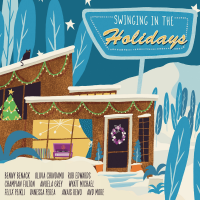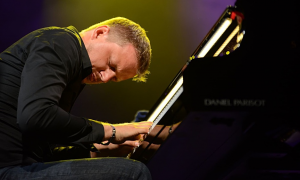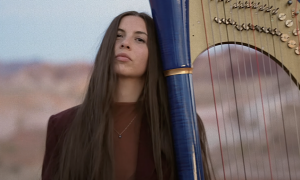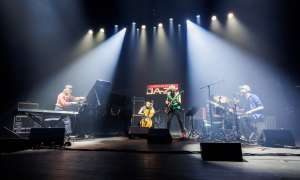Home » Jazz Articles » Interview » Lainie Cooke: Speaking to the Heart
Lainie Cooke: Speaking to the Heart
 When Lainie Cooke sings, the heart sinks in poetry made music; air seems to stop to avoid interrupting the flowing of such a magical, beautiful voice. She fills the barely-noticeable silence between notes with a voice that caresses the heart. Her life has been a jazz-bound adventure inspired by an early need to entertain others, landing her in New York City at a very young age.
When Lainie Cooke sings, the heart sinks in poetry made music; air seems to stop to avoid interrupting the flowing of such a magical, beautiful voice. She fills the barely-noticeable silence between notes with a voice that caresses the heart. Her life has been a jazz-bound adventure inspired by an early need to entertain others, landing her in New York City at a very young age.It's Always You (Harlemwood Records, 2008) is only her second studio album in a career spanning more than 40 years—perhaps that's why every song is so cherished, since Cooke does not visit the studio as often as many would want her to.
In a world where fast is often mistaken with better and more is usually less, being able to listen to some sensitively beautiful vocal jazz is always a good exercise for the exhausted mind. But Lainie Cooke seems to "rearrange the furniture," so to speak, and make a home of her own out of classics like "Too Close for Comfort," "The Very Thought of You" or "I Want to Talk About You."
All About Jazz: Who is Lainie Cooke?
Lainie Cooke: Nothing like starting with an easy question [laughs]. Lainie Cooke is changing all the time, but at my core, I am the music that I sing; I am the people that I love; I am the people that love me. I am still striving to become the artist I hope to be and probably never will. It took me years to even acknowledge that I was an artist. I will never be able to sing all the music that is inside me. I just don't know enough. I work to open myself to more and I sometimes get closer...All of that being said, I believe that the journey of the performer—the artist—is to become who you are and live your life telling that truth as best you can.
In the '60s we use to "play"—we were not scholars just seekers—at the I Ching. Throwing the coins and trying to divine and understand the words of the ancient text. Once when I asked it who I was, I threw "the cauldron." We decided that the meaning that made the most sense at that time was the one that meant "nourishment." That resonated for me. The surrogate earth mother, it was positive. I liked that.
AAJ: What is the main thing you would say about It's Always You?
LC: It's Always You was my second effort at making a CD; very different than the first. There was a desire, a need, to express a specific set of emotions. Probably as close to a ballad album as I might get. I believe the end result of a set or a CD should be to touch the listener—but also to entertain so an album of only ballads doesn't really meet my criteria. The first time I listened to the mix I listened alone and late at night. It seemed the perfect time to hear it.
AAJ: Tell me about the selection process of the songs, and why you picked the ones you picked.
LC: Song selection is difficult and personal. There are so many songs I'd like to sing. We started with songs I liked—that had some meaning for me—and I wanted to record. I rehearsed with [pianist/arranger] Tedd Firth on songs we had performed live and songs I wanted to try. We recorded a few songs that didn't make the CD because they didn't fit with what ultimately became a theme. I didn't really start knowing what would be the theme or that there would be a theme. It evolved. I found myself wanting to sing songs that reflected my own frustration with relationships over the years and that I thought others would understand, too.
Mike Melvoin sent me some tunes to consider and I loved "It's Always You." It said something to me: you can run, you can choose to deny, but when there's someone or something in your life that you love you will keep choosing it— it's always you. Some of the songs I have been singing since I was a teenager and yes, they were personal reflections of my emotional life and growth—or not—since that time.
AAJ: What is vocal jazz to you? And what is jazz to you?
 LC: Interesting. Vocal jazz to me means singing like an instrument—scatting. Something I don't do a lot of because I don't really think like a horn. Or more to the point, I don't know how a horn player thinks. I was trained first and foremost as an actor—the story and the melody always come first for me. I learned how to play the piano as a kid, but never well enough to accompany myself. The music just wouldn't come out of my hands—it came out of my throat, my head, my heart. But, scatting is something I can't stop myself from doing. It bursts forth. I think of it as my way of composing. Walking down the street by myself, without benefit of a trio or another player, is when I do my best composing/scatting. Unfortunately—or maybe fortunately—it is also my very private mediation and it's gone with the wind once it's out of my mouth.
LC: Interesting. Vocal jazz to me means singing like an instrument—scatting. Something I don't do a lot of because I don't really think like a horn. Or more to the point, I don't know how a horn player thinks. I was trained first and foremost as an actor—the story and the melody always come first for me. I learned how to play the piano as a kid, but never well enough to accompany myself. The music just wouldn't come out of my hands—it came out of my throat, my head, my heart. But, scatting is something I can't stop myself from doing. It bursts forth. I think of it as my way of composing. Walking down the street by myself, without benefit of a trio or another player, is when I do my best composing/scatting. Unfortunately—or maybe fortunately—it is also my very private mediation and it's gone with the wind once it's out of my mouth.
I just sing what I know and what I hear. I'm guessing I'm a jazz singer because of my understanding of time and, of course, the music I choose to sing.
AAJ: What is music to you?
LC: Music is a natural part of life, my life, everyone's life. Music is in everything. We all can make music. It is truly what heals us. Recently there have been studies that suggested it is "the arts" that make a healthy life. Last week on TV I saw a story about the growth of choral music in this country and how literally millions of people get together every week to sing with each other. What is the famous quote? "Without music life would be a mistake"—Neitzche. I think that says it all.
AAJ: What is the main thing we need to know about you, music wise?
LC: I love to sing. Just love it. Period.
AAJ: When did you start singing, and what is singing to you?
LC: I started singing when I was two or three years old. I saw my first microphone at my cousin Oscar's house. He was a musician and a piano teacher and he had a machine that made records. I recorded my first record there. I did my first radio show when I was six. My first TV show when I was 11. I was a band singer at 14. All of this in my hometown of Minneapolis.
 l:r: Tedd Firth, Matt Clohesy, Lainie Cooke, Reggie Quinerly
l:r: Tedd Firth, Matt Clohesy, Lainie Cooke, Reggie Quinerly
So singing for me is just natural. It's just what I do—like painters paint and dancers dance and scientists figure out electricity or a cure for cancer. I sing. I think it would have been amazing to be a person who discovered a cure for cancer, but singing is a good second.
AAJ: Who are your influences?
LC: The very first influence in my life was my mother. She was very musical. She played the piano by ear; she was smart and ambitious and unfortunately was born in that period when women didn't get certain opportunities. She made sure that I did. When I was about 16, she realized that I would leave home to pursue this life of music and theater. This did not make her happy. She stopped being so outwardly active for me and that was when I learned I could and would do it myself.
As for musical influences—Chris Connor, June Christy, Eydie Gorme, Jo Stafford, Rosemary Clooney. It was the '50s and I knew I could sound like those women. I yearned to sound like Ella Fitzgerald and Sarah Vaughan, but there voices were placed differently. I found myself listening more to Carmen McRae. There was something about how she approached a song that I could feel in my bones.
I have also been influenced and taught by every musician I have ever worked with. Probably the greater influences have come from the bass players. I have been so very, very fortunate—blessed if you will—to work with great musicians and great accompanists.
AAJ: Here's to Life—tell me all about it.
LC: From the time I was about 11 or 12 years old, making an album was part of my plan. I spent time as a teenager with friends and family working to get me a deal—nobody produced their own albums during that time and nobody was recording 12-year-old girls either. It took me until I was 60 years old for the stars in the sky to line up, and I finally made my first CD.
In the '80s I lived and worked for a short time in LA. When I was ready to record Here's to Life, I chose to record half of it in LA and half in New York. I wanted to make a CD with the musicians that I worked with in LA. Even after I was no longer living in LA, I would come back to sing and these are the guys I sang with. I wanted to record it. I wanted a record of it. I am so glad I did. Dick Shreve and Bob Maize have died and I loved working with them. Paul Kreibch is someone I still work with when I sing in LA. The music we made together on the CD is very beautiful to me. I'm glad I did it this way.
In New York, I had begun to work with Tedd Firth and I had worked for years off and on with Cameron Brown. Here's to Life is the first time I worked with Matt Wilson and the first time I worked with Joey Morant. David Lahm and I had worked together for many years.
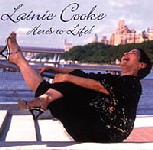 The CD was executive produced by my good friends Voza Rivers and Jamal Joseph. It would not have happened without them.
The CD was executive produced by my good friends Voza Rivers and Jamal Joseph. It would not have happened without them.
The songs were just songs that I had been singing live for a long time. We recorded at Peter Woodford's studio in LA and at The Studio in New York. All the tracks were mixed and mastered by Katherine Miller—who made it sound fabulous.
I cannot tell you how happy it made me to have finally recorded. It would have made my mother so very happy. Fortunately, my dad was still alive at the time. I had made a promise to myself that I would have a CD out there—that I now have two is staggering to me.
AAJ: What song you could sing forever?
LC: "Bye Bye Blackbird" is a song I have been singing forever...and I sing it at every live performance I do. I sing it for my mother and for my sisters and my family. My mother and I use to sing it together at every family function. It makes me happy to sing it. It's a great tune—you can swing it or sing it as a ballad. I think the arrangement on Here's to Life is very special.
AAJ: How did you become a voiceover actress?
LC: When I left the University of Minnesota (as a scholarship student in the Theatre Department), I wasn't sure what I wanted to be. A musical theatre performer or a night club singer. I did get my cabaret card—fingerprinted and everything. I auditioned for both as much as was possible. My first gig outside of New York was at the Hueblein Hotel in Hartford, Conn. It was a turning point. I didn't like being on the road. I didn't like being alone. The music part was great, but the rest of it was not so wonderful.
Then I got married and I knew that I definitely didn't want to go on the road. Soooo, when I was cast to do some demo work for a couple of commercials—first the jingle and then the VO—the rest is history. I didn't really think about it much at the time, I was just so happy to be working. I would be using my voice, I would be using my training as an actor and I would literally have to stay in town to be available for auditions and bookings.
I was very lucky to have gotten into that part of the business when I did. It was still a new area for actors—celebrities wouldn't be caught dead doing a VO or a commercial and it was great work for the actor who worked for scale.
For many years my work as a VO actor supported by work as a jazz singer. Not wanting to go out on the road there was no way I would be able to earn a living as a singer in town. I earned a living as a VO actor.
AAJ: Tell me about your time in Jamaica?
LC: One day my husband came home and asked me if I knew anyone or we knew anyone who might be interested in a chicken farm in Jamaica as a friend of his knew of one. I didn't realize at the time that he was interested. That was in April. In June, we went for a vacation with some friends to visit the island and the farm. In August, he moved there with some friends to begin work on the farm. In October, I followed.
We had 38 acres and a staff of about 25-30 people. We brought to market about 20,000 chickens a year. We sold chickens to the hotels, the private homes along the road to Montego Bay from our farm—5 miles up a mountain road in Great Valley, Jamaica, and also to the local market. I had the responsibility for the non-chicken part of the farm. When we first moved, I was a vegetarian. That didn't last long. But I grew parsley and green peppers and lettuces and radishes—salad stuff for the hotels. In fact, during the time I was there (3-4 years), I grew one crop of almost every kind of vegetable you could grow except tomatoes. And, oh yes, we also ran a restaurant on our property that served lunch.
I also was able to sing while I lived there. Many of the musicians who played in hotels were wonderful jazz musicians and they had formed a band that allowed them to arrange jazz standards and play concerts once or twice a month. I sang with them and I would also give a capella concerts on the back porch for friends.

There were many parts of living in Jamaica I loved; there were others that I didn't. In 1976, a state of emergency was declared by then-Prime Minister Michael Manley, due to a lot of unrest on the island. That unrest caused a decrease in the tourist business and we left not long after. No tourists—nobody to buy our chickens.
AAJ: Is that when you returned to New York City and LA?
LC: When I came back from Jamaica, my marriage was on its last legs and I soon filed for divorce. Amicably. I needed to get away from New York for a while and I had lots of friends and family in LA. I thought I would give it a try. I lived and worked there from 1979 to 1983. I sang in lots of jazz clubs. Funny, everyone would say to me you should record—but I somehow couldn't pull it all together at the time.
Although I left to go back to New York, where I was more comfortable actually earning a living, I knew I would be coming back a lot. My mother and father had moved to LA along with one of my sisters. One of my other sisters already lived there and another sister lived in the San Francisco area. It became my second home and for some time I was bi-coastal.
But New York is my home. I was born in Minneapolis, but I'm a New Yorker. I've lived here since 1961—longer than I've lived anywhere else.
AAJ: How were you involved in the American Federation of Television and Radio Artists (AFTRA)?
LC: I am a member of both AFTRA and SAG. For the last 12 years (maybe longer) I have served on both the New York local and national boards. I am currently the National Recording recording and the New York local recording secretary. As an elected leader, I serve on many committees and have lots of involvement.
I was an alternate this year to the commercial contract negotiations and have served on that committee in some capacity since 1997.
None of the leadership of the entertainment unions are paid. We are all volunteers. Being involved in the union is my way of giving back to an industry that has been very good to me. I have also learned an enormous amount about the business/industry and developed important and lasting friendships.
I am a strong believer in the labor movement in this country and a proud union member. There was a time when more workers were unionized all over this country. The disappearance of the importance of labor has greatly contributed to the loss of the middle class in this country. Without my union, I would absolutely be struggling to take care of myself today. I am not wealthy but what I do have is due to my unions.
AAJ: Tell me about musicians that cradle your voice on your CD It's Always You and performing onstage.
LC: The musicians on the CD are the guys I would play with every day and every night if I could. Lainie Cooke on stage is part of a band. I get so much pleasure from being on stage with these guys—listening to them, interacting with them, taking ideas from them—making music with them.
Tedd Firth, Cameron Brown, Matt Wilson—the rhythm section. They are musical, amazing, sensitive musicians. I have had the pleasure of working with them in the studio and on the bandstand. The same goes for Roland Barber Marvin Horne, Joel Frahm. Each one of these guys is a remarkable, marvelous soloist. You can talk and write about them for days, but what says it all is simply to listen.
AAJ: What's the perfect place to sing?
LC: The perfect place to sing is where you're singing. I have sung in large open spaces and in tiny crowded spaces. The where is not as important as the what and with who.
AAJ: How about the perfect song to live in?
LC: No such thing. I don't believe in one perfect anything. I don't believe in perfection. It's too rigid and stagnant an idea. Music and my feeling about a song is always evolving and what feels good this week may not work next.
AAJ: What is your biggest dream?
LC: I guess my biggest dream is to continue to sing and record and have a larger audience to sing to. I'd like to have the kind of life I thought I might have when I was younger.
AAJ: The biggest fear?
LC: Sorry, I don't believe I can share any of my fears. Too private; too personal. And I don't want them out in the wind. They can rest with me as I work them out.
AAJ: What are you most proud of?
LC: I don't really think about it—so this was not that easy to answer. I think I'm proudest of my relationships, my independence, my ability to stay loving.
AAJ: From your heart to ours.
LC: My heart is in everything I sing. If you come to share any of that with me, you know that my heart is speaking to yours and it is saying love is all we have.
Selected Discography
Lainie Cooke, It's Always You (Harlemwood Records, 2008)
Lainie Cooke, Here's to Life (Harlemwood Records, 2002)
Photo Credit
Courtesy of Lainie Cooke
Tags
PREVIOUS / NEXT
Support All About Jazz
 All About Jazz has been a pillar of jazz since 1995, championing it as an art form and, more importantly, supporting the musicians who make it. Our enduring commitment has made "AAJ" one of the most culturally important websites of its kind, read by hundreds of thousands of fans, musicians and industry figures every month.
All About Jazz has been a pillar of jazz since 1995, championing it as an art form and, more importantly, supporting the musicians who make it. Our enduring commitment has made "AAJ" one of the most culturally important websites of its kind, read by hundreds of thousands of fans, musicians and industry figures every month.












